Impact of Cognitive Biases on Individuals with Co-occurring Disorders
VerifiedAdded on 2022/08/12
|5
|728
|16
Discussion Board Post
AI Summary
This discussion board post examines cognitive biases, specifically status quo bias and confirmation bias, in individuals with co-occurring disorders. It explores how these biases impede decision-making and problem-solving abilities. The post then discusses the application of Cognitive Behavioral Therapy (CBT) techniques, such as mindfulness, to address and overcome these biases. The author emphasizes the importance of CBT in improving decision-making and problem-solving skills for individuals with co-occurring disorders. The post references scholarly sources to support its claims and fulfills the assignment parameters of length and critical analysis.
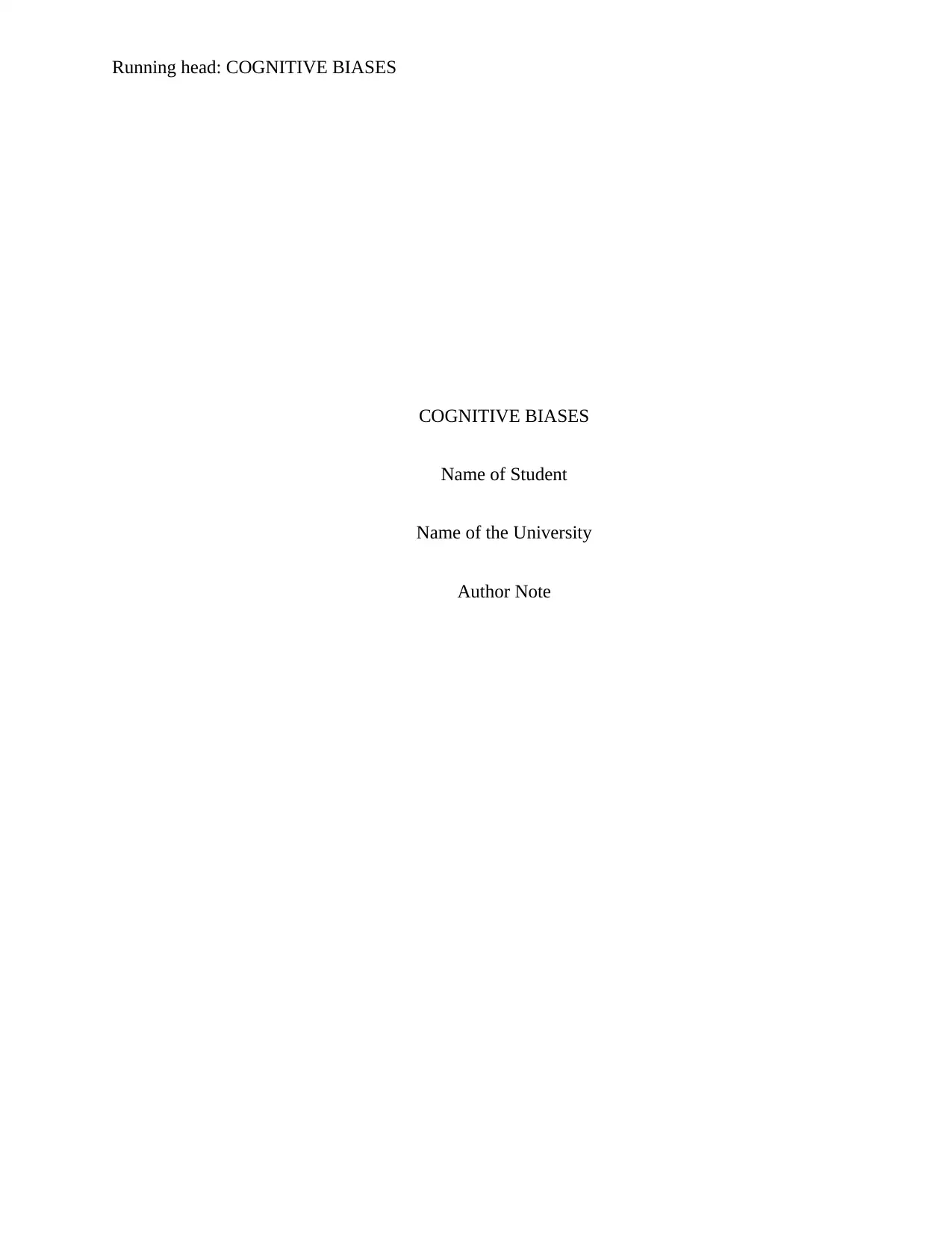
Running head: COGNITIVE BIASES
COGNITIVE BIASES
Name of Student
Name of the University
Author Note
COGNITIVE BIASES
Name of Student
Name of the University
Author Note
Paraphrase This Document
Need a fresh take? Get an instant paraphrase of this document with our AI Paraphraser
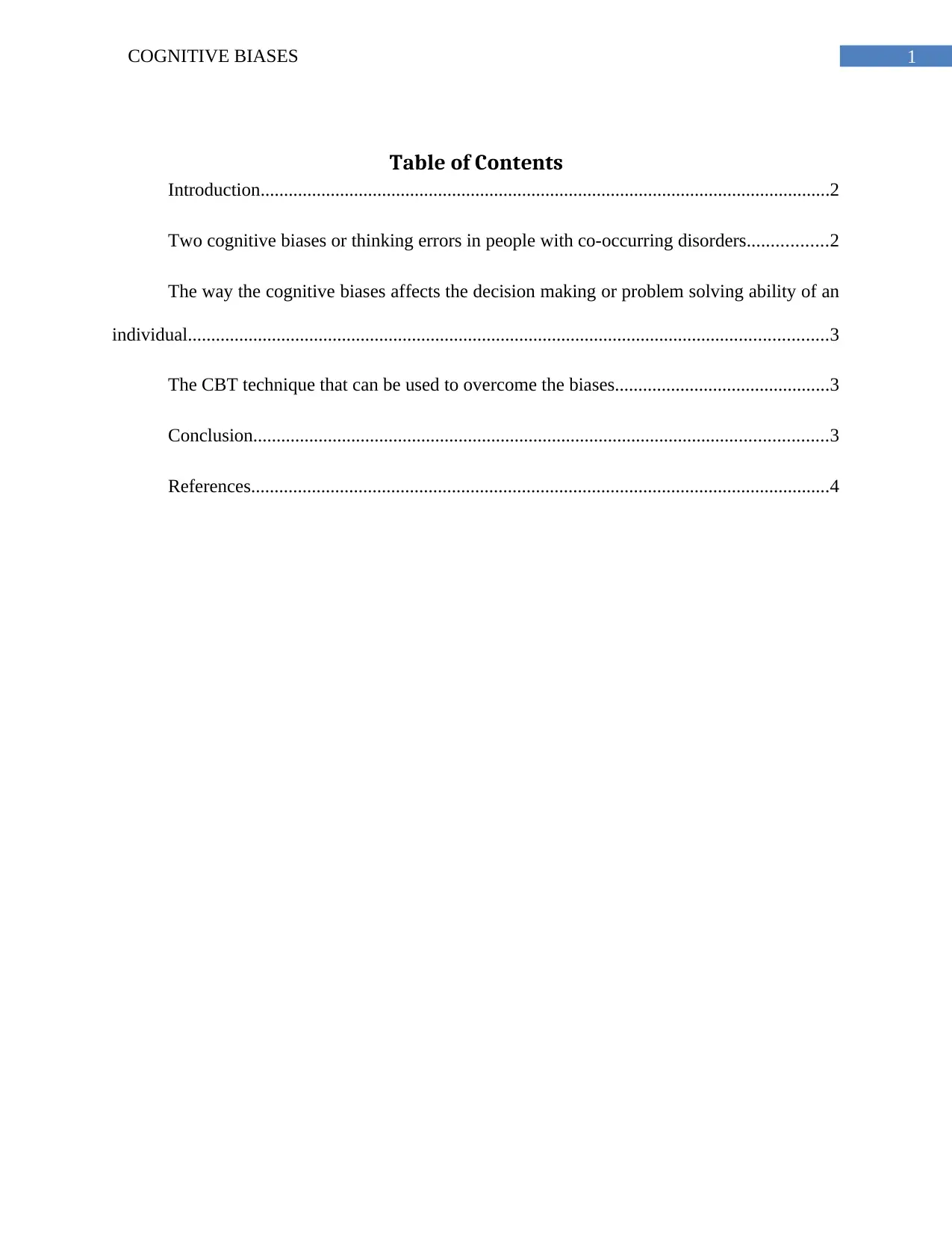
1COGNITIVE BIASES
Table of Contents
Introduction..........................................................................................................................2
Two cognitive biases or thinking errors in people with co-occurring disorders.................2
The way the cognitive biases affects the decision making or problem solving ability of an
individual.........................................................................................................................................3
The CBT technique that can be used to overcome the biases..............................................3
Conclusion...........................................................................................................................3
References............................................................................................................................4
Table of Contents
Introduction..........................................................................................................................2
Two cognitive biases or thinking errors in people with co-occurring disorders.................2
The way the cognitive biases affects the decision making or problem solving ability of an
individual.........................................................................................................................................3
The CBT technique that can be used to overcome the biases..............................................3
Conclusion...........................................................................................................................3
References............................................................................................................................4
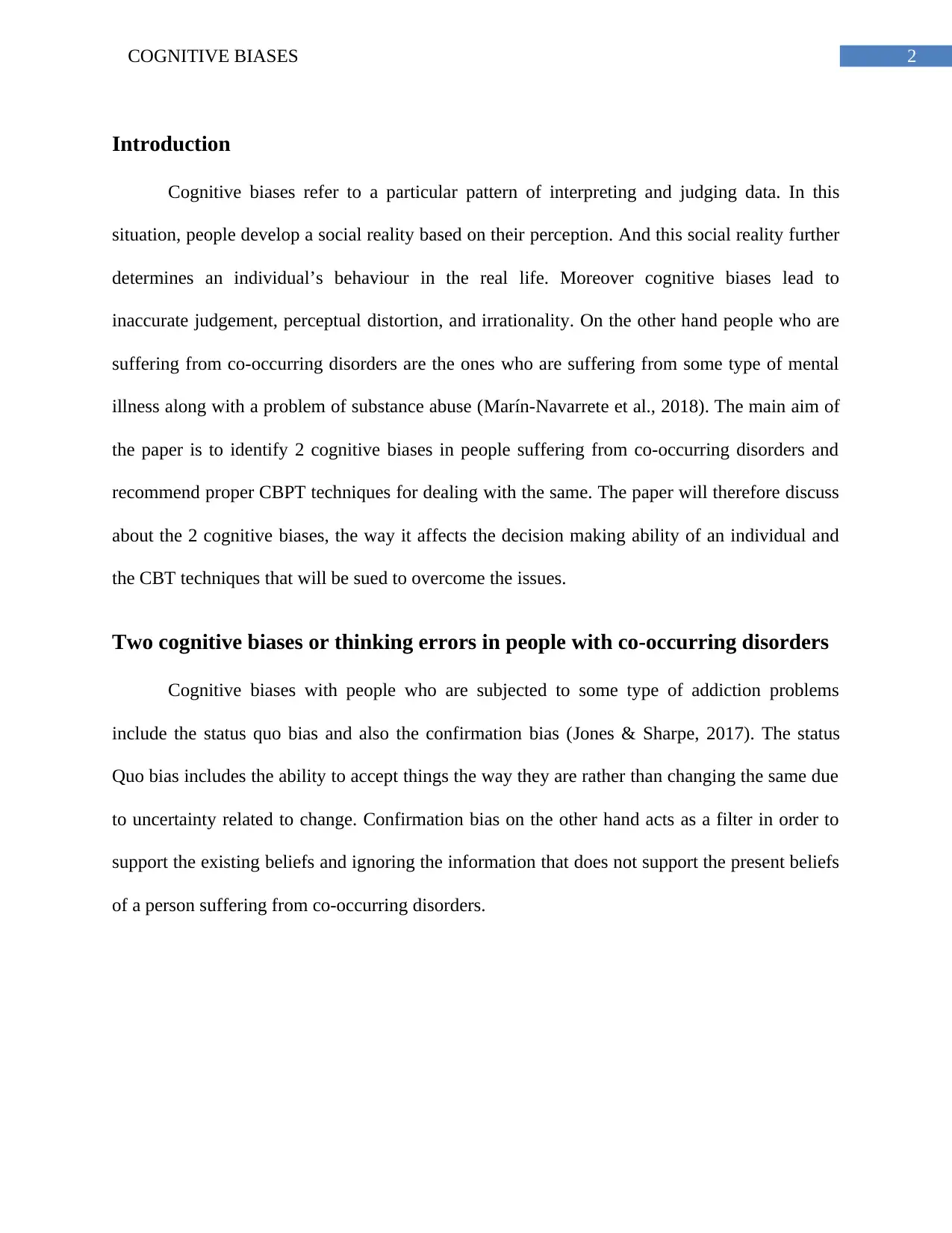
2COGNITIVE BIASES
Introduction
Cognitive biases refer to a particular pattern of interpreting and judging data. In this
situation, people develop a social reality based on their perception. And this social reality further
determines an individual’s behaviour in the real life. Moreover cognitive biases lead to
inaccurate judgement, perceptual distortion, and irrationality. On the other hand people who are
suffering from co-occurring disorders are the ones who are suffering from some type of mental
illness along with a problem of substance abuse (Marín-Navarrete et al., 2018). The main aim of
the paper is to identify 2 cognitive biases in people suffering from co-occurring disorders and
recommend proper CBPT techniques for dealing with the same. The paper will therefore discuss
about the 2 cognitive biases, the way it affects the decision making ability of an individual and
the CBT techniques that will be sued to overcome the issues.
Two cognitive biases or thinking errors in people with co-occurring disorders
Cognitive biases with people who are subjected to some type of addiction problems
include the status quo bias and also the confirmation bias (Jones & Sharpe, 2017). The status
Quo bias includes the ability to accept things the way they are rather than changing the same due
to uncertainty related to change. Confirmation bias on the other hand acts as a filter in order to
support the existing beliefs and ignoring the information that does not support the present beliefs
of a person suffering from co-occurring disorders.
Introduction
Cognitive biases refer to a particular pattern of interpreting and judging data. In this
situation, people develop a social reality based on their perception. And this social reality further
determines an individual’s behaviour in the real life. Moreover cognitive biases lead to
inaccurate judgement, perceptual distortion, and irrationality. On the other hand people who are
suffering from co-occurring disorders are the ones who are suffering from some type of mental
illness along with a problem of substance abuse (Marín-Navarrete et al., 2018). The main aim of
the paper is to identify 2 cognitive biases in people suffering from co-occurring disorders and
recommend proper CBPT techniques for dealing with the same. The paper will therefore discuss
about the 2 cognitive biases, the way it affects the decision making ability of an individual and
the CBT techniques that will be sued to overcome the issues.
Two cognitive biases or thinking errors in people with co-occurring disorders
Cognitive biases with people who are subjected to some type of addiction problems
include the status quo bias and also the confirmation bias (Jones & Sharpe, 2017). The status
Quo bias includes the ability to accept things the way they are rather than changing the same due
to uncertainty related to change. Confirmation bias on the other hand acts as a filter in order to
support the existing beliefs and ignoring the information that does not support the present beliefs
of a person suffering from co-occurring disorders.
⊘ This is a preview!⊘
Do you want full access?
Subscribe today to unlock all pages.

Trusted by 1+ million students worldwide
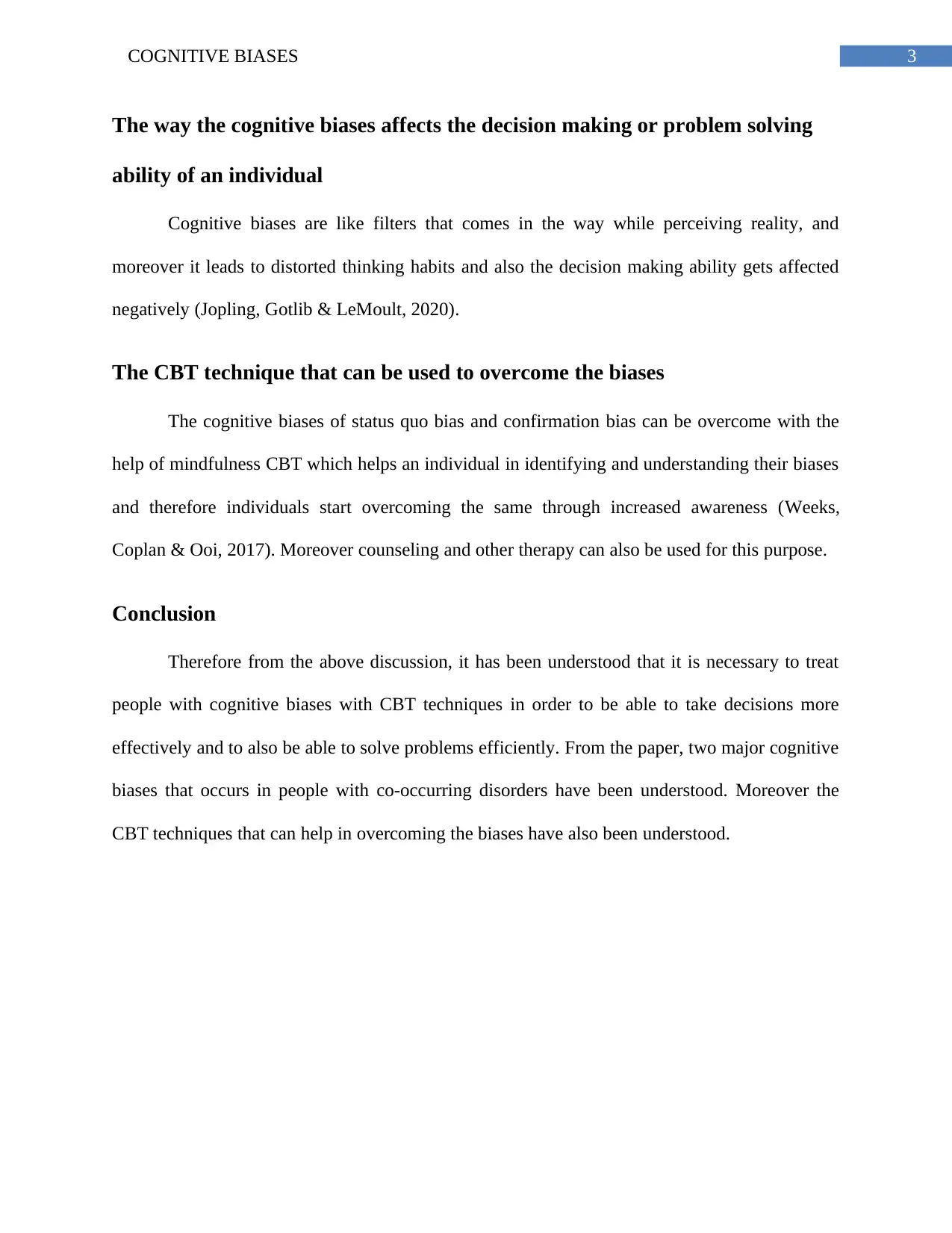
3COGNITIVE BIASES
The way the cognitive biases affects the decision making or problem solving
ability of an individual
Cognitive biases are like filters that comes in the way while perceiving reality, and
moreover it leads to distorted thinking habits and also the decision making ability gets affected
negatively (Jopling, Gotlib & LeMoult, 2020).
The CBT technique that can be used to overcome the biases
The cognitive biases of status quo bias and confirmation bias can be overcome with the
help of mindfulness CBT which helps an individual in identifying and understanding their biases
and therefore individuals start overcoming the same through increased awareness (Weeks,
Coplan & Ooi, 2017). Moreover counseling and other therapy can also be used for this purpose.
Conclusion
Therefore from the above discussion, it has been understood that it is necessary to treat
people with cognitive biases with CBT techniques in order to be able to take decisions more
effectively and to also be able to solve problems efficiently. From the paper, two major cognitive
biases that occurs in people with co-occurring disorders have been understood. Moreover the
CBT techniques that can help in overcoming the biases have also been understood.
The way the cognitive biases affects the decision making or problem solving
ability of an individual
Cognitive biases are like filters that comes in the way while perceiving reality, and
moreover it leads to distorted thinking habits and also the decision making ability gets affected
negatively (Jopling, Gotlib & LeMoult, 2020).
The CBT technique that can be used to overcome the biases
The cognitive biases of status quo bias and confirmation bias can be overcome with the
help of mindfulness CBT which helps an individual in identifying and understanding their biases
and therefore individuals start overcoming the same through increased awareness (Weeks,
Coplan & Ooi, 2017). Moreover counseling and other therapy can also be used for this purpose.
Conclusion
Therefore from the above discussion, it has been understood that it is necessary to treat
people with cognitive biases with CBT techniques in order to be able to take decisions more
effectively and to also be able to solve problems efficiently. From the paper, two major cognitive
biases that occurs in people with co-occurring disorders have been understood. Moreover the
CBT techniques that can help in overcoming the biases have also been understood.
Paraphrase This Document
Need a fresh take? Get an instant paraphrase of this document with our AI Paraphraser
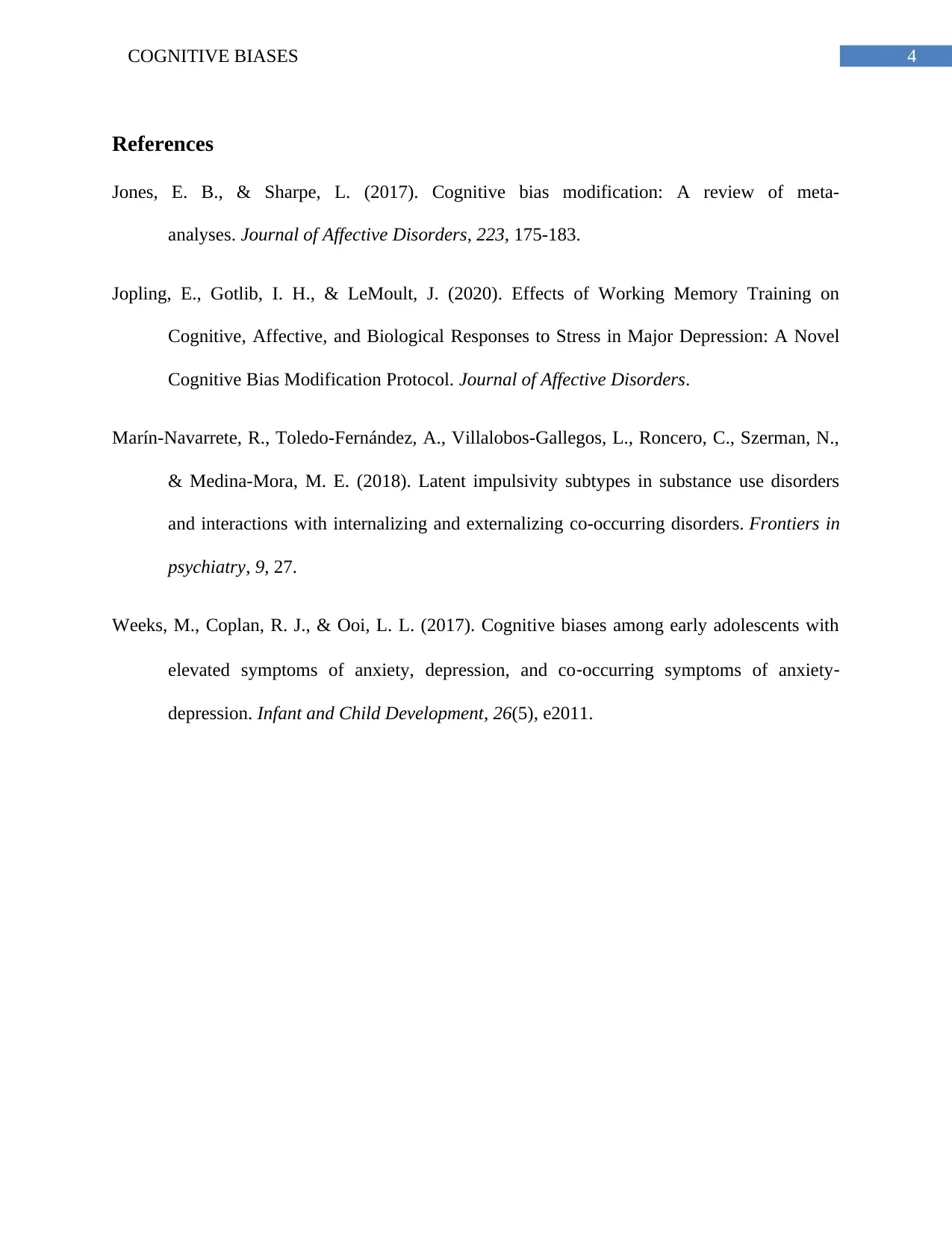
4COGNITIVE BIASES
References
Jones, E. B., & Sharpe, L. (2017). Cognitive bias modification: A review of meta-
analyses. Journal of Affective Disorders, 223, 175-183.
Jopling, E., Gotlib, I. H., & LeMoult, J. (2020). Effects of Working Memory Training on
Cognitive, Affective, and Biological Responses to Stress in Major Depression: A Novel
Cognitive Bias Modification Protocol. Journal of Affective Disorders.
Marín-Navarrete, R., Toledo-Fernández, A., Villalobos-Gallegos, L., Roncero, C., Szerman, N.,
& Medina-Mora, M. E. (2018). Latent impulsivity subtypes in substance use disorders
and interactions with internalizing and externalizing co-occurring disorders. Frontiers in
psychiatry, 9, 27.
Weeks, M., Coplan, R. J., & Ooi, L. L. (2017). Cognitive biases among early adolescents with
elevated symptoms of anxiety, depression, and co‐occurring symptoms of anxiety‐
depression. Infant and Child Development, 26(5), e2011.
References
Jones, E. B., & Sharpe, L. (2017). Cognitive bias modification: A review of meta-
analyses. Journal of Affective Disorders, 223, 175-183.
Jopling, E., Gotlib, I. H., & LeMoult, J. (2020). Effects of Working Memory Training on
Cognitive, Affective, and Biological Responses to Stress in Major Depression: A Novel
Cognitive Bias Modification Protocol. Journal of Affective Disorders.
Marín-Navarrete, R., Toledo-Fernández, A., Villalobos-Gallegos, L., Roncero, C., Szerman, N.,
& Medina-Mora, M. E. (2018). Latent impulsivity subtypes in substance use disorders
and interactions with internalizing and externalizing co-occurring disorders. Frontiers in
psychiatry, 9, 27.
Weeks, M., Coplan, R. J., & Ooi, L. L. (2017). Cognitive biases among early adolescents with
elevated symptoms of anxiety, depression, and co‐occurring symptoms of anxiety‐
depression. Infant and Child Development, 26(5), e2011.
1 out of 5
Related Documents
Your All-in-One AI-Powered Toolkit for Academic Success.
+13062052269
info@desklib.com
Available 24*7 on WhatsApp / Email
![[object Object]](/_next/static/media/star-bottom.7253800d.svg)
Unlock your academic potential
Copyright © 2020–2026 A2Z Services. All Rights Reserved. Developed and managed by ZUCOL.





